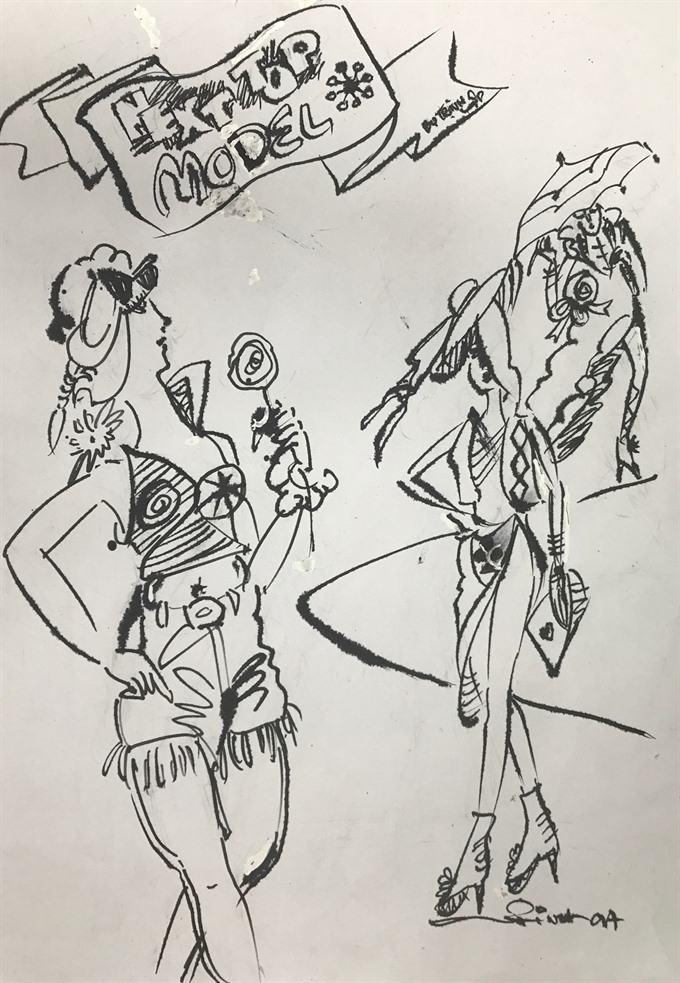 Talk Around Town
Talk Around Town

Not only celebrities such as actresses and singers but key opinion leaders in social media such as bloggers could have an impact on body image these days.
 |
| Illustration by Trịnh Lập |
By An Phương
“Hey! Have you gained weight lately?” and “What gym do you go to?” were some of my friends’ questions during a chat at a café last week.
Since I’ve always been tall and skinny, the concept of body shape and appearance has rarely concerned me. However, my friends’ conversation got me thinking about body image.
These days, anxiety about body image, in my view, has become a norm among most young people (at least, most I know).
“Just look at how fit singer Tóc Tiên is. I want to be like her,” Thanh Thanh, 23, one of my friends told me, adding that her favourite Korean idols are thin, too.
“To have a perfect body shape like that is a dream. I feel as if I could be successful or, at least, become ‘something’. It’s all about the look!” she said, laughing. “I’ve signed up for gym classes, have a healthier diet, and have felt more content lately.”
Trần Quý and Thu Hà agreed with Thanh, saying that the media played a huge role in portraying the “ideal” body image, causing people to question their appearance.
What surprises me is that not only celebrities such as actresses and singers but key opinion leaders (known as KOLs, or influencers, in their respective fields) in social media such as bloggers could have an impact on body image these days.
Hà believes the internet provides a perfect platform for fitness bloggers such as Hana Giang Anh or Linh Nguyễn to reach more people. Since their lifestyles are more like celebrities’ lives, their followers are more likely to look up to them and have similar concerns.
“But different from celebrities, I can actually learn from them as they update fitness tips regularly on Facebook, Instagram and YouTube,” she said.
She also noted that individuals working in fields such as flight attendants, receptionists and marketing officers need to have a toned physique.
“There’s nothing wrong with striving to be skinny and fit if it benefits your career and makes you feel more confident about yourself,” she added.
That being said, however, many people, especially the older generation, have argued that being too thin can have negative effects on your mental health.
Take my mom as an example. Though I’ve been fit my entire life, she always pushes me to eat to become chubbier as she thinks it is healthier.
“The more you eat, the more nutrients will get into your body,” my mom said, adding that it is an Asian thing that good luck will come to those who are on the chubbier side.
“Many young men and women these days resort to compulsive exercise, strict diets or laxatives, or make themselves sick in attempts to lose weight. That’s dangerous!” she said. “I blame the media and celebrities for reinforcing these unrealistic ideals of physical perfection.”
To be honest, although I don’t completely buy her argument that chubbiness equals luck, I agree with her second point that taking harsh measures to lose weight is unhealthy.
According to research, people should consume a certain amount of nutrients from different types of food to provide the body with necessary fuel to perform physical activities.
The lack of nutrition can lead to decreased energy, muscle loss, malnutrition, eating disorders and even depression.
“To achieve a healthy, toned physique, we should eat clean food, not eat less,” blogger Hana Giang Anh has said.
In my opinion, the concept of beauty is subjective, as different people have different ways of looking at it. While some might feel pretty being thin, others might choose to be chubby and cute.
Since there’s nothing that we can do to reduce the amount of media exposure and its message about the perfect yet unrealistic body types, it’s up to us to step back, decide what matters most, and seek relevant exercise and diet plans.
“I believe that one is prettiest when people are confident about themselves. Be proud of your body, but recognise when changes need to be made and do them right!” my friend Hà told me. — VNS




